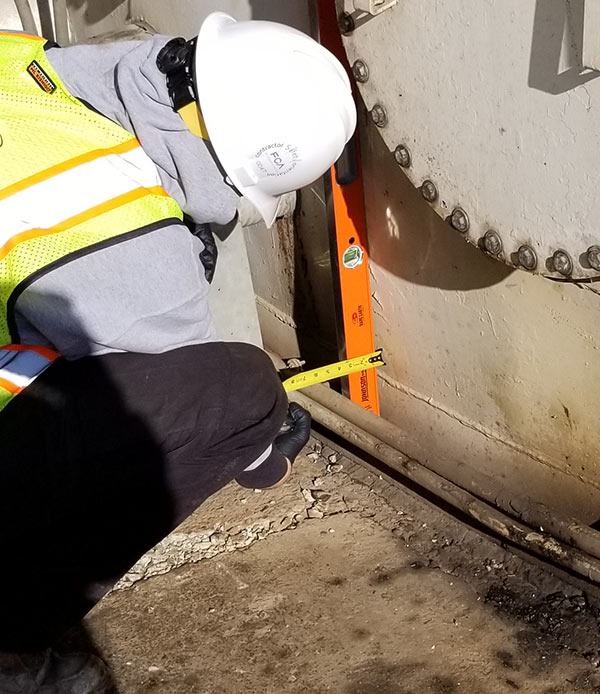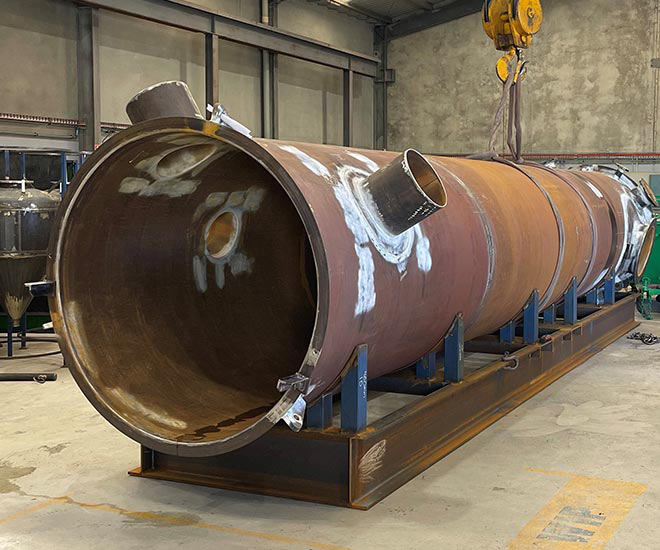Contact Us
It Is All About Kiwis Supporting Kiwis
Email us
Phone us
Timaru | P. +64 3 688-6713
Christchurch | P. +64 3 348-6713
Te Rapa, Hamilton | P. +64 7 850-1177
Dunedin | P. +64 3 477-1713
Nelson (Survey NZ) | P. +64 3 547-4069
It Is All About Kiwis Supporting Kiwis
Email us
Phone us
Timaru | P. +64 3 688-6713
Christchurch | P. +64 3 348-6713
Te Rapa, Hamilton | P. +64 7 850-1177
Dunedin | P. +64 3 477-1713
Nelson (Survey NZ) | P. +64 3 547-4069

DE Consulting Engineers is one of New Zealand’s leading non-destructive testing specialists that carry out a wide range of conventional and advanced non-destructive testing, inspection, hazardous substances, API standards for oil tank storage and asset integrity services.
API 653, Tank Inspection, Repair, Alteration, and Reconstruction, is a standard developed and published by the American Petroleum Institute (API) and covers the inspection, repair, alteration, and reconstruction of steel above ground storage tanks used in the petroleum and chemical industries.
DE CEI Inspection’s specialised range of storage tank inspection services assists our customers in maintaining their tank inspection activities, maintenance and repair schedules, to ensure maximum availability while complying with New Zealand / Australian and International Standards as well as EPA requirements.

A thorough inspection is crucial to prevent leaks, tank failures, and unexpected maintenance costs.
We have experienced API 653 tank inspectors who can evaluate the inspection data, perform remnant life calculations, design weld repairs and prepare weld procedures.
API 570, Piping Inspection Code: In-Service Inspection, Repair, and Alteration of Piping Systems, is an inspection code developed and published by the American Petroleum Institute (API). The inspection code covers in-service inspection, rating repair, and alteration of metallic and fiberglass-reinforced plastic (FRP) piping systems and their respective pressure relieving devices.
API 510 covers the inspection, repair, alteration, and rerating activities for pressure-containing vessels as well as the pressure relieving devices that protect the equipment covered in the code.


DE Consulting Engineers are specialists in Non-Destructive Testing (NDT Testing) in New Zealand. We offer Radiography, Ultrasonic, Phase Array, Magnetic Particle and Visual Welding Inspections and Welder Qualifications.
Starting in 1991 the Design Engineering team has over 100 years combined experience with the latest and best equipment for NDT and welding testing. This means we are one of the most efficient and experienced NDT inspection companies in New Zealand. You can be assured of first class service to look after your valuable assets, staff and inspection work.
We use an extensive range of modern techniques and procedures applicable to your industry sector to help you achieve total plant integrity.
1. Welded Joints
2. Castings
Ultrasonic Examination of Metals
1. Wrought Products
2. Welded Joints
3. Castings
4. Forgings
Penetrant Testing (fluorescent & Visible)
1. Water Washable Method
2. Solvent Removable Method
Magnetic Particle Testing (fluorescent & Visible)
1. Magnetic Flow Method
2. Current Flow Method
Non Destructive Tests by Eddy Current Testing (Al, Cu, Fe, Ni, Mg, Zn)
(a) Surface flaw detection
(b) Metallic coating thickness measurement
(c) Sorting of materials & Components
(d) Sub surface flaw detection
(e) Weld Testing
Visual Inspection of metals
(i) Welded Joints
Ferrous Metals (incl. Stainless Steels)
(ii) Castings
Prevent the harmful effects of corrosion
The National Association of corrosion Engineers (NACE) International standards apply to corrosion prevention and control and are used by a multitude of industries where corrosion is a key concern. These guidelines assist industries during the design, building and operation of systems and minimize the negative impacts of corrosion. NACE standards enable you to:
Without proper monitoring, big industrial containers like boilers or pressure vessels can slowly wear down due to corrosion, causing leaks or failures and contributing to poor performance and reliability.
In extreme cases, if corrosion is left unmonitored it can lead to the all-out failure of an asset, and even explosions, posing safety risks to personnel, huge equipment costs, and subsequent environmental damage.
A great coating Inspector ensures that structures, surfaces, and materials are all correctly coated to meet manufacturing standards. Inspectors examine samples for compliance with specifications by conducting visual and physical inspections for thickness, adhesion, chip resistance, edge coverage, and other properties
What is a NACE coating inspector?
NACE inspectors look at the coatings on water tanks, refineries, pipelines, military installations, nuclear power and natural gas plants, wastewater treatment plants, shipyard and marine structures, bridges, and other structures.

Welding Qualification Examining Body Inspections required to verify compliance with the process for qualifying welders for fusion welding of steels in accordance with AS/NZS 2980
Welder qualifications in accordance with specifications such as:
IQP stands for Independent Qualified Person. These people are authorised by a territorial authority to carry out any inspection, maintenance and reporting on the specified systems of a building as related to that building’s compliance schedule. Once their inspection and all that it entails are complete, they can certify that these procedures have been carried out correctly in accordance with said compliance schedule.
All independently qualified persons must be familiar with the Building Act 2004 and all other relevant obligations under the nation’s Building Warrant of Fitness (BWoF) rules and regulations. Additionally, they must have a trade background in the particular specified system that they are qualified to inspect, maintain, repair, and report on.


If you would like to find out more about our services, or you have an opportunity for Design Engineering to assist with your engineering service requirements on any given project, and/or require a free quotation, please contact us
Adding {{itemName}} to cart
Added {{itemName}} to cart